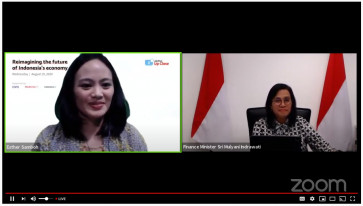Popular Reads
Top Results
Can't find what you're looking for?
View all search resultsPopular Reads
Top Results
Can't find what you're looking for?
View all search resultsDiscourse: Not just about pouring out money: Sri Mulyani discusses pandemic response
If we look at all the areas that are being severely damaged by COVID-19, including the people who are suddenly unemployed and have become poor or the small and medium businesses that [suffered] from no informal activity because of social distancing measures, this is where we use all the policy instruments to address the most important short-term situations without losing sight of the fundamental and structural issues that Indonesia needs to address.
Change text size
Gift Premium Articles
to Anyone
T
he COVID-19 pandemic is unlike any past crisis Indonesia has experienced. It has overburdened the healthcare system and crushed the economy, forcing the government to take unprecedented measures to attempt to revive business while keeping people safe and healthy.
Finance Minister Sri Mulyani Indrawati spoke recently with The Jakarta Post’s deputy managing editor, Esther Samboh, during a Jakpost Up Close webinar about the future of Indonesia’s economy. She said she expected the gross domestic product (GDP) to stall at a near-zero rate this year because the pandemic had taken a greater toll on economic activity than previously expected.
She also explained the government’s measures to soften the impact of the pandemic and discussed a plan for structural reform to transform the country’s economy and achieve Indonesia’s 2045 vision, which centers on human development. The following are excerpts from the interview.
Question: How will the pandemic affect Indonesia’s 2045 vision of becoming a developed country with a per capita income of Rp 270 million (US$18,270) per year, as laid out by President Joko “Jokowi” Widodo? What are the risks of failing to speed up economic recovery?
Answer: This is exactly the theme of the 2021 state budget: the question of how we are going to use this [moment] of public crisis to actually conduct more reforms that are fundamentally important for Indonesia in the medium and long term.
If we look at all the areas that are being severely damaged by COVID-19, including the people who are suddenly unemployed and have become poor or the small and medium businesses that [suffered] from no informal activity because of social distancing measures, this is where we use all the policy instruments to address the most important short-term situations without losing sight of the fundamental and structural issues that Indonesia needs to address.
We have discussed the middle-income trap a lot, as there are many fundamental issues, including issues related to human capital, innovation and productivity, infrastructure, bureaucratic efficiency and the ease of doing businesses in Indonesia that need to be addressed. We are still working on those issues.


















